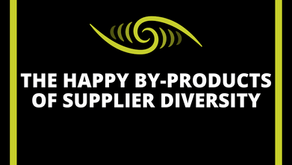Supplier Diversity is a global practice that is slowly growing in Aotearoa. Internationally it is buying from minority owned suppliers, but in a local context it’s specifically buying from Māori and Pasifika businesses.
Some people read this and scratch their heads asking “but why?”. A supplier is a supplier right? Does it matter that the owners are Māori and/or Pasifika? Well, it turns out some suppliers aren’t getting a fair slice of the pie and those suppliers are Māori and Pasifika.
The primary benefit of supplier diversity is giving fair access to these businesses to compete and win contracts. But the impacts of buying from Māori and Pasifika businesses far exceed the transactional process of just purchasing their goods and services. There are inherent social outcomes created through Māori and Pasifika entrepreneurship where so much additional value is created. We call this the happy by-products of supplier diversity.
This article details just a few of these happy byproducts.
Disclaimer: Obviously, not every Māori and Pasifika business is the same and is why we call these outcomes happy by-products rather than the primary outcome.
1.) Quadruple bottom line
It is well documented that Māori businesses go beyond the bottom line. They serve multiple bottom lines such as commercial, environmental, social, and cultural objectives(Mill & Mill; 2021).
The generation of profit is rarely the sole driver for Māori and Pasifika entrepreneurs, and many of these businesses tell us they are interested in the wider societal impacts they could have for their community.
Businesses like Kia Tupato, Social Labour Supply and Aotahi are great examples of businesses that have been established for reasons beyond profit. Business for them is the vehicle to create greater impact.
This is supported by Australian research, which shows that for every dollar of revenue, Indigenous businesses create A$4.41 of economic and social value (Burton and Tomkinson; 2016).
2.) Māori businesses employ more Māori people
JOBS. JOBS. JOBS. That’s the mantra in times of economic shocks. There has always been a need to create employment opportunities particularly for underserved communities and supporting Māori and Pasifika businesses is one way to ensure quality employment outcomes for Māori and Pasifika.
In September 2021, New Zealand unemployment stats sat at 3.4%. However for Māori and Pasifika, it sits at 7.8% (as of June 2021) more than double the national average. Māori businesses employ more Māori people.
The 2019 Te Matapaeroa report published by Te Puni Kōkiri showed that Māori businesses have, on average, 43% Māori employees, which is three times the national average.
Furthermore, Amotai data show that Māori and Pasifika businesses have on average 70% Māori and Pasifika employees.
These statistics are consistent with international studies that demonstrate indigenous businesses are more likely to create jobs in their local communities compared to other businesses.
It is clear, if we as a nation want to extract more value from our spend (employment outcomes and supplier diversity), Māori and Pasifika businesses are the answer.
3.) Employing and supporting those furthest from the labour market
As noted above Māori and Pasifika businesses are high employers of Māori and Pasifika and this is important because Māori and Pasifika have much higher rates of unemployment. This is even more important for rangatahi. Māori youth not engaged in education or employment sits at 17.8% ( as at June 2021). This is incredibly worrying as Māori and Pasifika are young populations and are the workforce (and tax base) of the future. Amotai data shows Māori and Pasifika businesses are high employers of rangatahi.
On average Māori and Pasifika businesses employ 21% rangatahi; those under 24 years of age. But why are they able to retain such a high number or rangatahi? Anecdotal evidence from businesses shows that they are willing to give second and third chances and work harder to wrap pastoral care around them so they attach to the labour market.
Rangatahi say working for someone who looks like them, sounds like them and has had a similar lived experience to them helps them to find a sense of belonging and identity at work where their cultural values are part of the norm. This encourages rangatahi Māori to stay in employment and not become disengaged from the workforce. Getting rangatahi to successfully stay in employment means a lower NEET and a lower impact on our welfare system.
4.) Improving identity and cultural connection
Māori cultural values such as manaakitanga (respect and generosity), kaitiakitanga (guardianship), and whanaungatanga (relationships) have shaped Māori economic relationships for generations, which are increasingly being reflected in business.
Values are intrinsically embedded and entwined in our day-today lives and creates an environment to operate safely as a commercial and cultural entity. International studies have found that indigenous-owned businesses are more likely to strengthen the connection of indigenous employees to their culture. They provide safe and welcoming spaces in which people can connect with each other and their culture (Burton and Tomkinson; 2016).
Research also shows that a strong cultural identity helps Māori build resilience and protection against psychological distress. This is important as it helps build resilient and connected communities.
5.) Māori and Pasifika businesses create role models
Māori and Pasifika business owners are role models for their whānau, community and employees. The latest research from the NZ Productivity Commission showed that the success of Māori businesses helps light the path for other Māori businesses in their wake (Mill & Mill; 2021). What we see is that often one business might win a contract and create such a great experience for the buyer that it enables others the opportunity to compete for work with that same buyer.
It’s also common to see tuakana-teina modelling by Māori and Pasifika businesses where they mentor and grow each other. A 2014 study of 324 indigenous entrepreneurs found that nine out of ten minority suppliers also acted as positive role models for young people in their communities (Cit. Hudson, R; 2016). What this means is that our rangatahi can see what they can be. It allows them to aspire to be entrepreneurs and creators of their own businesses and economic futures.
6.) Creating intergenerational wealth
We know there is a great economic divide between communities in Aotearoa, one that is ever widening, but we have the means to change the tide through supplier diversity. Research shows that diverse businesses play a critical role in closing the racial wealth gap in areas of disadvantage (CAMSC; 2016).
Here in Aotearoa, our experience is that Māori and Pasifika businesses are the untapped change agents in creating a more inclusive, and more sustainable New Zealand economy. Entrepreneurship is one of the main ways Māori and Pasifika can build wealth for their families and communities.
Research shows that Māori business owners earn more than Māori employees, so supporting Māori businesses helps create pay equity and intergenerational wealth creation. What we see is how this can be a gamechanger for Māori and Pasifika to have more autonomy and decision making power over their life and future and be able to save and invest for their children and grandchildren to break the cycle of living pay cheque to pay cheque.
We know that supplier diversity is a way to create equity in supply chains, and this is reason enough to implement the practice.
But as this article demonstrates, the impacts go far beyond simply purchasing goods, services and works (and we haven't even touched on innovation, environmental outcomes and charitable giving etc.).
The point is there is a lot of impact that can be realised and these benefits are good for Aotearoa as a whole.
So, how can you use these additional benefits to help you support the value of supplier diversity in your organisation?


